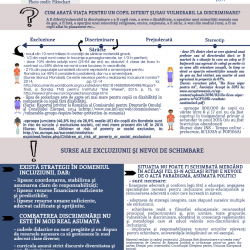You can learn discrimination but you can also unlearn it, isn’t it?
I dared formulating a title which incorporates rhetoric of consensus because I invite you to explore three common sense ideas:
1) The social space of scholar interaction implies lots of challenges (impossible or hard to control), but also affordable solutions (for example, project-based learning).
2) Official curriculum won’t guarantee quality experiences, with an impact on students. The explicit-implicit game, hidden curriculum (which means what is learn without being “taught”) can sometimes sabotage explicit intentions of the school;
3) Thinking local is no longer enough, we need an understanding of citizenship in a globally context;
A few years ago, on the 9th of October, while visiting a school, I was invited to participate in Intercultural Education activities that were taking place that day. 8th graders from Class A were watching Schindler’s List in the festivities hall, 8th graders from Class B were listening to manele in the next room. The memory of this event haunted me for a long time. Explicitly, the school was having activities that were promoting diversity. Implicitly, it was discriminating, by having expectations and practices perpetuating stereotypes.
On one hand, this experience reflects the way by which the identity “genotype” converts itself in phenotypic discrimination. On the other hand, this came to mind in May 2016 when the proposals for reviewing gymnasium curriculum were being fierily discussed. The debates made me think about the (sometimes vicious) game between explicit and implicit in an educational space. Some specialists and officials of civil society proposed a one year study of Children’s Rights. Later on, we had Social Education as a mandatory field of study for all four years of Gymnasium. Concretely, within this generic field of study, the curricula will be scheduled as following: one hour per week of Critical Thinking and Children’s rights for 5th grade, Intercultural Education for 6th grade, Education for a Democratic Citizenship for 7th grade and Financial-Economics Education for 8th grade. I have no doubt about the benefits of an explicit approach of children’s rights or of diversity management. In the same time I’m concerned about the way critical thinking, intercultural elements or respecting children’s rights should not only be a subject for study but something that children have in their day-by-day life.
Explicit presence in the curriculum may be a pre-condition but won’t guarantee a quality study. Having practical activities, such as analyzing cases from real trials proves to be more effective on a long term in knowing USA Constitution than it would be by simply studying it as a subject of study (?). It is important the way children learn about their rights but also about the way these are acknowledged, respected and activated during daily interaction.
Why am I giving these examples? Research shows that by having real time experiences, opportunities for decision making regarding their lives and an active role in the learning process, teenagers and children develop their non-cognitive abilities in the most efficient way. How frequent do our schools provide children and teenagers such opportunities for exercising these abilities? Where and how to they practice solidarity, in comparison to competition and individualism? How often are they just receivers and passive executants of some learning and training scenarios, designed by the adults around them, teachers and parents? Teaching a Children’s Right class is not enough when children are still abused and their perspective ignored. Explicitly, there is no doubt, we’ll always have parallel speeches and a rhetoric of consensus about such delicate matters. What can you do to cultivate in children, in an authentic way, feelings of solidarity, shared responsibilities and concern for nature and the others? On one hand, be it a parent or a teacher, you are an example. On the other hand, you can create situations that can offer contexts for real-life inspired learning, of which you can project tasks that would stimulate personal responsibility, participation and responsibility towards their community. My answer for the “How do you do that?” question is: stimulating project-based learning (read more information).
John Dewey is one of the best known advocates of project-based learning. The American philosopher regards the school as a miniature society, that stimulates children’s interests, learning from experiences and preparing for democracy. Project-based learning is a pedagogical approach inspired by constructivism, focused on children, which consists in deepened investigation (individual, small or large groups) of a theme or a problem of interest for students. The evaluation is of both the process and the results. By making projects, you don’t only speak about discrimination but you also explore social justice issues, you solve real problems related to discrimination and you can make concrete products.
What makes me for such a long time a supporter of project-based learning? The complexity and impact of this approach, which implies: cognitive dimension (what do you learn?); socio-relational dimension (co-responsibility towards others); emotional dimension (how do you feel?) and civic dimension (how can I contribute in making life better in my community?). Projects activities promotes strengthening of knowledge and abilities as well as cultivating a positive attitude for learning and civic spirit within community. All these aspects can be found explicitly and implicitly in any project, for any age group. The only thing that can differ is the complexity of addressed problems and the level of refinement for the learning processes.
I started form the idea that identity „genotype” converts itself in phenotypic discrimination. The many facets of identity, polished with time, can become targets for discrimination: ethnic affiliation, religion, gender, social class, disabilities, language. Recent migrant waves, as well as terrorist attacks, have brought to our attention the global world citizen concept. It’s no longer enough to refer only to our own experiences, but we need to start from this. We begin, concentrically, from what we experience to what is happening beyond us, in the world. Projects working experience leads to understanding of complex, big-scaled, interconnected phenomena. Students investigate real issues, exploring what causes them and proposing sustainable solutions, using critical thinking, exercising empathy, concern and respect. Just as you can learn discrimination, by having these kind of activities, children and teenagers can come to find causes and effects, understanding behaviors and personal values and analyzing the economic, cultural, political and social interdependence. With projects, they can critically reflect on heritage and tendencies from their own cultural spaces, they also can imagine different scenarios about the future, assuming responsibility for their actions.
As I was saying in the beginning: You can learn discrimination but you can also unlearn it, isn’t it?
by Cătălina Ulrich









